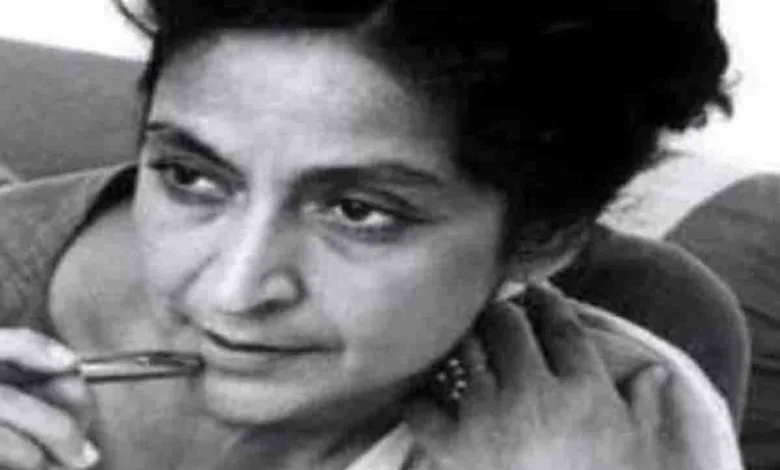Amrita Pritam’s anguished plea to Waris Shah was written when she was on a train from Dehradun to Delhi

Monday, 29 January 2024 |
GUEST COLUMN
 Jaskiran Chopra
Jaskiran Chopra
The partition could not divide the composite culture and literature of Punjab.It runs in the blood of the people and makes the geographical division meaningless.The famous nazm of renowned Punjabi poet Amrita Pritam is regarded as her masterpiece and it brought her great fame at the age of 28. It was the first major literary expression on the pain and anguish of the partition. It captured the hearts of people on both sides of the border as it expressed their pain without mentioning any community or religion.Ajj Aakhaa’n Waris Shah Nu is the title of the nazm she wrote in November 1947 while she was on a train from Dehradun to Delhi. She had been in Dehradun for some time after leaving Lahore. Little must have she known that this poignant poetic appeal to Waris Shah would make her immortal.Even today people on both sides recite and sing this nazm which urges the great Sufi poet to rise from his grave and take a look at Punjab that has been soaked in blood and the daughters of Punjab have been ravaged by the mad violence.
It is so fascinating to know that famous poet Faiz Ahmed Faiz said that he read this nazm while he had been imprisoned and when he came out, he found that people were reciting it on the streets and tea shops of Lahore.Just as Waris Shah and his great work titled Heer Waris Shah is common to people on both sides, so is Amrita’s nazm that moves people to tears.She tells Shah, who is now regarded as a Peer, to write a new page in the history of Punjab. He should rise and do something for the weeping daughters of Punjab. For Heer, he wrote reams. Today, thousands of Heers are being tortured, humiliated and killed.These daughters, says Amrita, are looking towards Shah.Heer’s uncle Qaidon poisoned her.Today, so many Qaidons are stealing love and beauty. Where should we look for another Waris Shah?
I am sharing the major part of the nazm with its English translation by Khushwant Singh…
Ajj Aakha,’n Waris Shah nu,kito’n kabara ‘n vicho’n bole,te ajj kitaab e ishq da koi agla varqa Phhol,Ik royee si dhhi Punjab di,tu likh likh maare wain,ajj lakhan dhhiyaa,’n rondiayan,tainu Waris Shah nu Kehn,Uthh Dard manda deya daria,Uthh tak apna Punjab,Ajj Bele Laasha,’n vichhiayan,te lahu di bhari Chenab,kisay ne Panja’n paaniyan wich diti zeher ralaa ,te ohna paaniyan dhart nu dita paani la,jithhay Wajdi si phhook pyar di,oh vanjhli gayi gawaach,Ranjhay de sab veer ajj bhool gaye uss di jaach,dharti te lahu vasya,kabara’n paiyan chon,Preet diyan shehzadiyan,ajj vich mazaara’n Ron,Ajj sabe Qaidon bann gaye,husn ishq de chor,ajj kithho’n lehaaiye lab ke,Waris Shah ik hor?Ajj Aakhaan Waris Shah nu,kito’n kabra’n vichon bol,te ajj kitaab e ishq da,koi agla varqa Phhol.
To Waris Shah, I turn today
Speak up from the graves amidst which you lie.
In our book of love, turn the new leaf
When one daughter of the Punjab did cry,you filled pages with songs of lamentation
Today a hundred daughters cry, O Waris Shah,to speak to you,
O friend of the sorrowing, rise and see your Punjab,
corpses are strewn on the pasture,blood runs in the Chenab,
Some hand had mixed poison in our five rivers,the rivers in turn had irrigated the land, where the windpipe trilled songs of love,that flute has been lost,
Ranjha and his brothers have lost the art,
Blood keeps falling upon the earth, oozing out drop by drop from graves,
the queens of love weep in tombs,It seems all people have become Qaidons,thieves of beauty and love,
where should I search out another Waris Shah?Waris Shah,open your grave,write a new page in the book of love.
This nazm will always be relevant in the world where bloodshed and mindless violence happens often. It is a poet’s plea to humanity to move towards love and beauty.Her personal pain became the voice of the people and even today, this nazm is recited and sung at the Dargah of Waris Shah at Jandiala Sher Khan where the poet was born.It is in Sheikhupura near Sialkot.An annual Urs is held there and Heer is sung at large gatherings throughout the year.The Punjabi Sufi poet is now saint Waris Shah whose mazar is visited by people from both sides of Punjab and others too.The nazm is secular in nature and thus belongs to the entire humanity.
The story of Heer and Ranjha presented by Waris Shah in his 1766 work was quite different from some earlier versions that were penned.His version has remained the most loved and ultimate narration of the legend which came into Punjab’s folklore and then into literature. Shah wrote the love story to enhance and beautify the legend while depicting the society, institutions,customs,language and landscapes of Punjab.His work is the best creative expression of Punjabi genius.Renowed film maker Chetan Anand has immortalised the story in his 1970 film Heer Ranjha which had dialogues in poetry written by Kaifi Azmi and enchanting music by the great Madan Mohan.The film Pinjar,based on Amrita Pritam’s story had this nazm on Waris Shah sung by Wadali brothers.This Qissa of Heer and Ranjha ,down the centuries,has fired the imagination of artistes on both sides of the border,giving rise to paintings,songs,poetry,dramas and films.
It is believed that this was a true story as the graves of the two lovers exist in Pakistan.However it changed down the years and this story of timeless tragic love became larger than life. In Waris Shah’s Heer, the character of Ranjha is quite similar to that of Waris himself.The tune in which the verses of his Heer are sung has existed since his own times.I grew up listening to Heer being sung by people in the family.
This beautiful lament was the first major poetic expression of the horrors of the partition and will thus always have a very special place in literature.
(The author is a senior journalist. Views expressed are personal)





